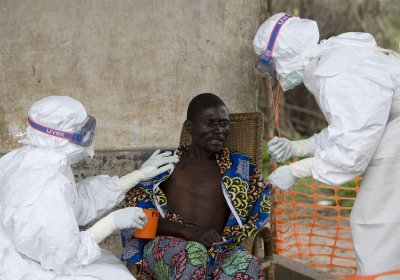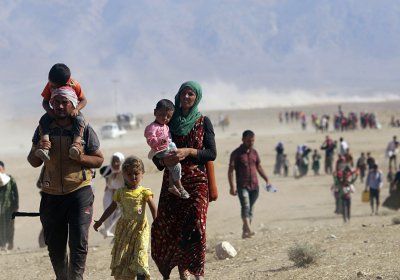Ecuador's pro-US neoliberal president Lucio Gutierrez was ousted in 2005. Since then, relations between Ecuador and the United States have deteriorated, with the Andean nation’s increasing rejection of US hegemony.
The government of Rafael Correa, first elected in 2006, has broken from the neoliberal doctrines Washington has imposed on Latin America. It has embraced regional integration, moving closer to its neighbours and further away from the US.
Diplomatic cables published by WikiLeaks show how hard the US fought to control Ecuador's future post-Gutierrez.
United States
According to John Kenneth Galbraith, the economist who chronicled the Great Crash of 1929, the Great Depression did not actually end. Rather, it was swept away by World War II.
Something eerily similar seems to be happening with the global economy since the onset of the global financial crisis (GFC) six years ago.
The vice-chairperson of the US Federal Reserve, Stanley Fischer, said: “The global recovery has been disappointing … year after year we have had to explain from mid-year why the global growth rate has been lower than predicted as little as two quarters back.”
As the deadly disease Ebola spreads throughout West Africa, some in the West have been engaging in fear-mongering and racism. Others are seeing this deadly outbreak as a golden chance to profit off desperation.
But the high death toll is caused by the intersection of Ebola and poverty.
Ebola is a hemorrhagic fever with symptoms that include headache, vomiting and diarrhoea, as well as the signature symptoms of internal and external bleeding. It is caused by a virus that is spread through contact with fluids such as saliva, urine, blood and semen.
Thousands marched in Staten Island, New York City, on August 23 to protest against the police murder of an unarmed Black man, Eric Garner, in July.
The action was led by Reverend Al Sharpton, who has been outspoken against police brutality since the killing.
The marchers were inspired by the mass protests in Ferguson, Missouri, against the murder of unarmed Black teenager Michael Brown by police. They took up the chant of the Ferguson protesters ― “Hands Up! Don’t Shoot!”
Since Ecuador's president Lucio Gutierrez was ousted from power in 2005, relations between Ecuador and the United States have deteriorated with the Andean nation’s increasing rejection of US hegemony.
The government of Rafael Correa, first elected president in 2006, has embraced regional integration, moving closer to its neighbours ― in particular Venezuela and Bolivia ― and further away from the US.
Economically, the Correa administration has pursued policies that break with the neoliberal doctrines Washington had imposed on Latin America.
Venezuela's communication minister Delcy Rodriguez has condemned “racial discrimination” in the United States. Responding to the police shooting of unarmed black teenager Michael Brown, Rodriguez said the incident was symptomatic of a broader problem.
She said: “In the United States more than one third of the African American population has experienced some form of discrimination. The death of Michael Brown was not an isolated incident.”
In the past few weeks, several large protest movements have rocked the Untied States political establishment and the elites it represents. These social explosions seem limited and separate, but they symbolise the growing contradictions of US society and the possibilities of mass struggles in the near future.
The US has been carrying out air-strikes in Iraq since August 8 for the first time since officially ending their occupation at the end of 2011.
The strikes were aimed at the extremely violent multinational terrorist group previously known as Islamic State of Iraq and Syria, but which recently renamed itself Islamic State (IS) to reflect its global ambitions.
“Hands up! Don't shoot!”
This slogan was taken up by community protesters right after the murder of 18-year-old African American Michael Brown by police in the St Louis suburb of Ferguson, Missouri, on August 9.
Brown had his hands up in surrender and shouted “Don’t Shoot!” when a white cop shot the unarmed teen six times.
His body was left lying on the ground for four hours before the police had it picked it up. This callousness further angered the Black community, who make up about 70% of the small town.
Dozens of artists, musicians and writers from around the world have signed the open letter below, such as hip-hop artist Boots Riley and music journalist and Red Wedge Magazine editor Alexander Billet. It is reprinted from Red Wedge Magazine, where the full list of names can be found.
* * *
In an action that has reverberated around the world and inspired pro-Palestinian activists, five days of pickets by activists prevented a ship from the Israeli shipping company Zim Integrated Shipping Services from unloading almost any of its cargo at the port of Oakland.
The blockade was organised as part of the global boycott, divestment and sanctions campaign targetting Israel called for by dozens of Palestinian civil society groups. It was the longest blockade yet of an Israeli ship anywhere in the world.
In New York, "Peoples Power Assemblies" and their allies called an emergency anti-police brutality demonstration on August 18. It came amid ongoing national protests against the police killing of unarmed Black teenager Michael Brown in Ferguson, Missouri on August 9, and the police killing of Black man Eric Garner in New York on July 17.
Demonstrators march demanding an end to police violence and the racial profiling. The photos below are by photo journalist Edward Leavy. You can see more of his photos here.
- Previous page
- Page 94
- Next page







